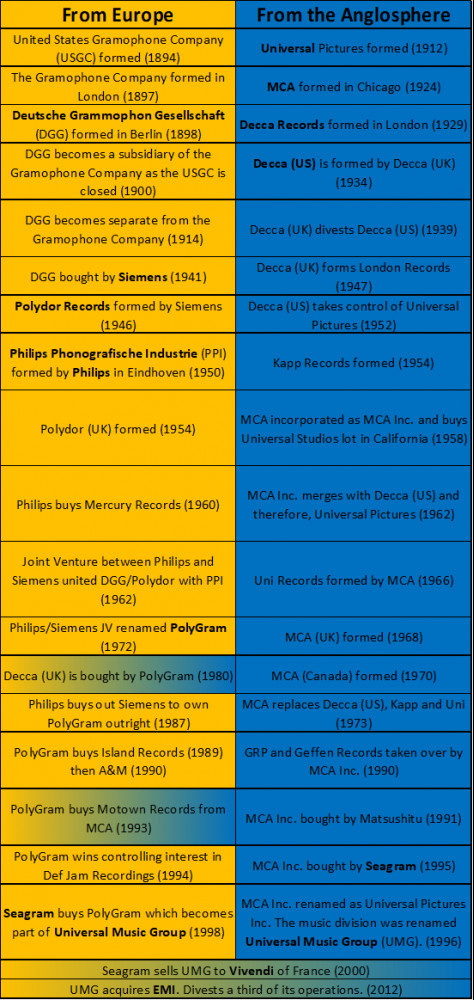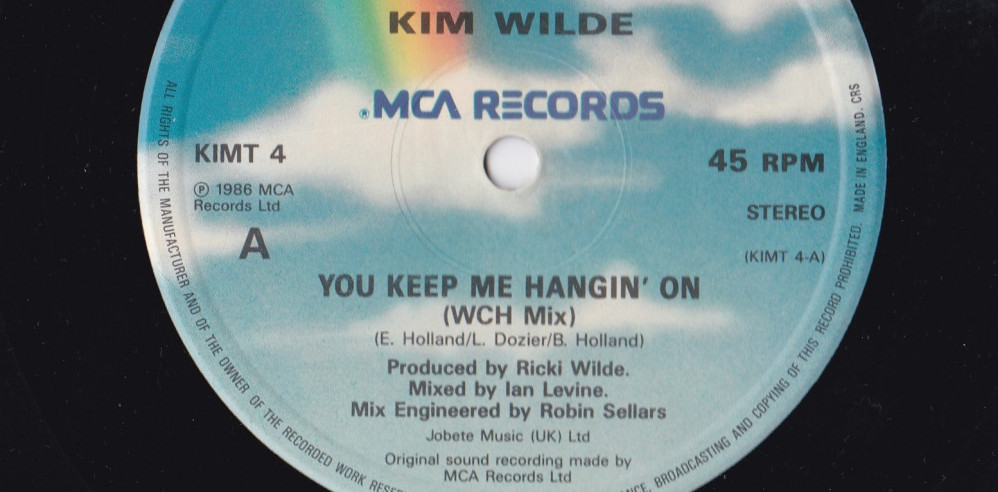Introduction
Welcome to the third article in a series on the world’s largest record labels. Or should I say the first article on the world’s largest record label? This is because the Universal Music Group accounts for two-thirds of the entire market share in the US and Canada. As big as they are, Sony and Warner Music are mere tiddlers in comparison.
Universal Music Group is a Dutch-American organisation. Its corporate headquarters is in Hilversum, Netherlands, and its operational headquarters is located in Santa Monica, California.

It operates a myriad of record labels such as EMI, Island Records, Decca Records, and Polydor in the UK, plus Capitol Music Group, Def Jam, Motown, and Polygram in the US. These are but a tiny handful of their worldwide stable which also includes eponymous companies in most territories.
History
Much like the origins of the world’s great rivers The Nile and The Amazon, the exact starting point of Universal Music is open to interpretation. What is clear is that there are two strands. Depending on your point of view, one is Anglo-Saxon in origin, the other continental European.
Anglo-Saxon origins and the evolution of the name Universal
We can start anywhere along this strand, but since we’re looking at a record label, let’s start with one. And since we’re looking at the Anglo-Saxon origins of the Universal Music Group, let’s start in London.
The original Decca record label was a British company, founded by Edward Lewis in 1929 when he bought the Decca Gramophone Company and the Duophone Company and merged them into the Decca Record Company Ltd.
Now he had a company which manufactured both gramophones (record players) and the records themselves. Before the merger, Lewis had famously said of the Decca Gramophone Company that “a company manufacturing gramophones but not records was rather like one making razors but not the consumable blades.”
In 1934, Lewis founded American Decca with Jack Kapp and Milton Rackmil. At the onset of WW2, Lewis sold off American Decca and the two went their separate ways until reunited under Universal’s umbrella in 1998.
At the time of the divergence, Decca (US) issued records in the Americas and Japan, whilst Decca (UK) issued records in the rest of the world. Records by Decca (US) artists were released outside of the Americas on the Brunswick and Coral record labels. Decca (UK) formed a new US subsidiary, London Records in 1947.
Universal Pictures
Now let’s visit the early fifties,1952 to be precise. At this time, we see Decca (US) achieving a controlling stake in Universal Pictures which itself had been first incorporated in 1912 as the Universal Film Manufacturing Company in NYC. For the first time, we see the name Universal in connection with music and vinyl records. Does this organisation then have a better claim to be the originator of Universal Music?
Founded by German Jewish immigrant to the US, Carl Laemmle, The Universal Film Manufacturing Company was originally an alliance between his company, the Independent Moving Picture Company of America, along with the New York Motion Picture Company, Rex Motion Pictures, Powers Motion Pictures, Nestor Films and Champion Films.
MCA
Then, in 1958, MCA (Music Corporation of America) acquired the Universal Studios Lot in the San Fernando Valley, CA to use it for its new television division, MCA Inc. Universal Pictures leased back its facility to continue making films. By 1962, MCA Inc. and Decca and therefore Universal Pictures had merged into MCA Inc.
MCA was formed in 1924 in Chicago, IL by Jules Stein, and William R. Goodheart, Jr. Originally it was a booking agency. The idea for the business came to Stein, who was a musician, when he had hired a substitute for a gig he couldn’t make and was able to pay the substitute a small reduction on the fee he himself had received for the gig. The agency stood out in that it offered the option for venues to book acts for single performances rather than full seasons which was then the industry norm.
Now the owner of both a record label and a film studio, in 1964, MCA made its move into music publishing with the purchase of Leeds Music from music publisher Lou Levy. In 1967, the Brunswick and Coral record labels were replaced by the new MCA Records label outside of North America and in 1968, MCA Records UK was launched.
By 1973, MCA Records, based at Universal Studios, CA, had replaced three separate record labels in issuing records in the US:
- Decca (US)
- Kapp Records (founded in 1954 by Jack Kapp’s brother David), and
- Uni Records (established by MCA in 1966)
MCA’s Canadian offshoot Compo Company was reorganised into MCA Records (Canada) in 1970.
The period from the late 1970s until the late 1980s was one of great churn for MCA Records. Short-lived subsidiary, Infinity Records was founded in 1977 and retired by MCA in 1979. The failure was partly due to the epic failure of an album of recordings by Pope John Paul II.
Then, in came ABC Records and Gulf and Western’s record labels. Also added were Sugar Hill Records (incl. Chess Records) and Motown Records (later sold to PolyGram). Major artists arrived into the fold bringing with them a set of challenges, which although not unique in the music business, were exacerbated by challenges such as that presented by the PMRC (Parents Music Resource Center) regarding ‘potentially explicit’ content.

Then there were examples of MCA shooting itself in the foot, for example, its 1980 decision to charge superstar prices for releases by certain artists.
Universal Music Group
After the acquisition in 1990 of GRP and Geffen Records, 1991 saw MCA Inc. taken over by Matsushita of Japan. Four years later, it was taken over again, this time by Seagram Ltd, the one-time distillery, but now multi-national conglomerate, from Waterloo, Ontario, Canada.
In 1996, MCA Inc. was retired as the company name with the company becoming Universal Studios Inc. Its music division was renamed as Universal Music Group. At this time MCA Records was still retained as a stand-alone record label within the group.
Seagram’s demise
Seagram’s purchase of MCA Inc. was funded by the sale of its shares in DuPont, the American chemicals company. This was seen as a bad move by Standard and Poor which downgraded Seagram’s over $4 billion of long-term debt.
Within five years, Seagram had added PolyGram (owners of the original Decca label) to its entertainment division but had been effectively taken over by French company Vivendi. Seagram’s drinks business was sold off to another French company, Pernod-Ricard and the company ceased to exist.
Continental European Origins
Deutsche Grammophon Gesellschaft
Deutsche Grammophon Gesellschaft or DGG was founded in 1898 by the father of the gramophone record, Emil Berliner. He had earlier founded the United States Gramophone Company in 1894 and the Gramophone Company in London in 1897.
DGG became a subsidiary of the Gramophone Company in 1900 after Berliner’s trials and tribulations in the US had led to the closure of the United States Gramophone Company and the formation of the Victor Talking Machine Company in its place. After the start of the First World War, DGG seceded from the Gramophone Company and cut ties with the Victor Talking Machine Company.
Polydor Records
DGG was acquired by Siemens in 1941. Due to the classical output of DGG, Siemens decided that it needed a popular music label. So, in 1946 the company formed Polydor Records. A British subsidiary Polydor UK was formed in 1954.
Philips Phonografische Industrie (PPI)
Formed in 1950 by the Philips, PPI was the Dutch electronics giant’s first foray into issuing records. Its first popular music artists were drawn from a range of nations with classical offerings from Germany, France, and the Netherlands. British releases began in 1953 with 10” 78 rpm records and LPs a year later. Arrangements with Columbia/CBS to release recordings were followed in 1958 by the formation of a subsidiary label, Fontana Records.
Philips further expanded its music business, buying the Chicago-based Mercury Records in 1960. This gave Philips the ability to market and distribute its latest invention. A one-eighth of an inch (3.81mm so actually nearer to a seventh of an inch) cassette system which could be played at home or in the car. Of course, this was to become the ubiquitous cassette tape which revolutionised the home recording of vinyl records and music from the radio and spawned such consumer icons as the Sony Walkman.
Philips/Siemens Joint Venture – aka PolyGram
In 1962, a joint venture between the two electronics behemoths was formed. Philips acquired a 50% stake in Siemens’ Deutsche Grammophon Gesellschaft (classical music) and 50% of Polydor Records (popular music). At the same time, Siemens acquired a 50% stake in PPI, renamed Phonogram.
Although the classical music aspect of the venture was highly successful, overall, there was not enough profit to enable international distribution. So, in the early 1970s, another foray into the American industry was made with the purchase of Verve Records, the popular jazz label, and the distribution network of United Artists. A 49% share of Chappel Music Publishing with its myriad music copyrights was also secured at this time.
Finally, in 1972, the joint venture was given the name, PolyGram. This was a portmanteau word, with Poly from Polydor and Gram from Phonogram.
Expansion and money problems for PolyGram
Moving through the 1970s and 80s, PolyGram bought the Robert Stigwood Organization Ltd (Grease), Casablanca Records (Donna Summer) and Decca (UK). It was also party, with Philips, to the launch of a new playback media, the compact disc.
However, although sales were astronomical, so too were production costs and PolyGram was losing money hand over fist. In 1983, Siemens decided that it wanted to relieve itself from the pressure of such a drain on its balance sheet. PolyGram and Warner Communications were discussing a merger at this time, but both German and American economic regulators refused to sanction such a deal.
Philips to the fore
In 1984, PolyGram’s publishing house, now called Chappel-Intersong to Warner for a sum believed to be in the region of $100 billion. Philips bought Siemens out in two tranches and by 1987 PolyGram was a wholly owned subsidiary of the Dutch company.
Moving through the 1980s and into the 1990s, PolyGram was busy. Their hiatus from publishing was short-lived as PolyGram Music Publishing was created in 1986. In 1989 Island Records was acquired and a year later A&M Records joined the PolyGram stable.
Then in 1991, PolyGram signed an international license agreement with MCA’s recently acquired Motown Records and then purchased the label in 1993. In 1994, the company acquired a controlling interest in Def Jam Recordings. Then, in 1998, PolyGram and Deutsche Grammophon were bought by Seagram and thus joined the Universal Music Group.
Life as a Vivendi Company
In 2004, Vivendi sold most of Universal Studios to General Electric and then embarked on an ambitious programme of expansion. In 2006, BMG Music Publishing was added to the UMG roster. Harking back to the days of MCA’s original booking/talent agency, UMG added Sanctuary a talent agency managing the likes of Justin Bieber and Lady Gaga.
In 2008 UMG bowed to the inevitable by making its catalogue available to Spotify the new streaming service, initially on a trial basis and only outside the US.
By far the biggest move made by UMG though, was 2012’s acquisition of EMI, an icon of the British music scene. With opposition from the Independent Music Companies Association (IMPALA), and a counter bid from Warner, both EU and US authorities did approve the merger, but only with conditions set by the EU.
The new, expanded UMG was required to divest itself of a third of its total operations. As a consequence, Warner Music Group were able to obtain Parlophone Records, albeit without the Beatles catalogue, which UMG retained. UMG gave up the likes of Mute Records, Chrysalis Records, and Now That’s What I Call Music!
Current Position
In the years since 2012, UMG has consolidated itself as by far the largest of the three giants of the music industry. Partnerships with companies such as Lego, Spotify and Mercedes-Benz have seen a diversification in operations. UMG now operates in every corner of the globe.
Labels and artists
Because UMG is so huge, there follows an infinitesimally small selection of their labels and the artists associated with them.
|
EMI |
Island Records |
Decca Records |
Polydor |
|
|
|
|
|
Capitol |
Def Jam |
Motown |
Polygram |
|
|
|
|
If you have enjoyed this article or have anything you would like to add to the debate, please leave me a comment below.
